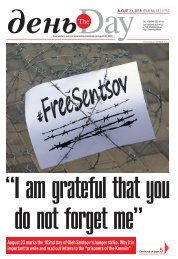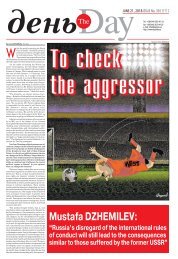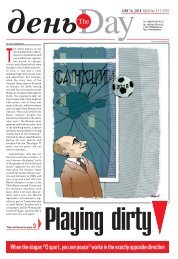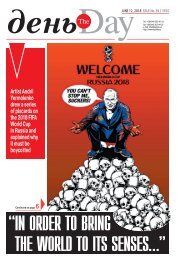#1_1-8
Create successful ePaper yourself
Turn your PDF publications into a flip-book with our unique Google optimized e-Paper software.
6<br />
No.1 JANUARY 16, 2018<br />
CLOSE UP<br />
WWW.DAY.KIEV.UA<br />
By Roman GRYVINSKYI, The Day<br />
● “INDUCING PHILOSOPHICAL<br />
THINKING IS ONE OF<br />
THE FACTORS THAT CAN<br />
CHANGE A NATION”<br />
Mr. Sekundant, we have seen the<br />
development of public philosophy in<br />
Ukraine in the past few years.<br />
Philosophers deliver public lectures<br />
and debates in the media, including<br />
the newspaper Den/The Day. The<br />
journal Filosofska Dumka has even<br />
devoted one of its issues to this. What<br />
do you think is the mission of a public<br />
intellectual in Ukraine today? What<br />
prospects and perhaps risks does this<br />
trend open?<br />
“Public philosophy is rather a rare<br />
phenomenon. It is usually political<br />
scientists and sociologists who go public,<br />
whereas the philosopher is a more<br />
profound person and, therefore, the<br />
public finds it more difficult to apprehend<br />
him or her. But this trend really<br />
exists and is rather new for Ukraine.<br />
Andrii Baumeister, Oleh Khoma, Oleksii<br />
Panych, Mykhailo Minakov are just<br />
a few names that came to my mind. It<br />
is a very useful phenomenon, and I can<br />
only welcome it. But I don’t know if the<br />
audience will grasp what these people<br />
want to put across to it. The point is<br />
that audiences are accustomed to ‘nonphilosophical’<br />
communication. The<br />
philosopher is supposed to disclose the<br />
root causes of the phenomena we come<br />
across. And it is a great art to speak<br />
about profound things in simple terms.<br />
Luckily, people endowed with this talent<br />
do occur, albeit rarely.<br />
“There has always been a problem<br />
of failing to understand things, including<br />
philosophy. Sometimes it<br />
seems to me that many philosophers<br />
became great only because they did<br />
not manage or, maybe, did not want to<br />
understand their predecessors. For<br />
example, Kant seems to have read neither<br />
Wolf nor Leibniz in detail.<br />
“It is a question of an important<br />
historical factor, not of risks. But for<br />
an extensive popularization of philosophy<br />
among the masses, the formation<br />
of such philosophy-minded nations as<br />
India, Greece, and – in the Enlightenment<br />
era – Germany would have been<br />
impossible. In the 18th-century Germany,<br />
almost every provincial newspaper<br />
had a huge philosophical section.<br />
German burghers were thus discussing<br />
philosophical problems and<br />
gradually got accustomed to philosophical<br />
thinking.<br />
“Some Kyiv philosophers complain<br />
that too many philosophy departments<br />
have come up in Ukraine<br />
today, which is a profanation of philosophical<br />
education. It is partly true,<br />
but, on the other hand, the more people<br />
are involved in the philosophical<br />
process and thinking, the better. It is<br />
one of the factors that help change the<br />
nation.<br />
“For the totalitarian past is still<br />
weighing upon our society – people<br />
are afraid to think independently. We<br />
are very dependent and have a lot of<br />
complexes. This is illustrated, in particular,<br />
by the quality of dissertations,<br />
most of which are rather superficial<br />
and distracted from real problems.<br />
At the same time, the interest of<br />
the broad masses in philosophy is supposed<br />
to promote transformation of<br />
academic philosophy which customarily<br />
popularized the postulates of<br />
Marxism-Leninism in the Soviet era<br />
and is still eschewing the pressing<br />
problems of man and society.”<br />
● “WE HAD A CHANCE TO GO<br />
A DIFFERENT WAY IN THE<br />
1990S, BUT WE MISSED IT”<br />
Do you think philosophy has had<br />
a strong impact on the identity of a<br />
contemporary human being? Is it true<br />
that the formation of certain philosophical<br />
ideas can become an important<br />
historical and cultural factor for<br />
not only intellectuals, but also society<br />
as a whole?<br />
The ways of the “philosophy<br />
of common sense”<br />
Serhii SEKUNDANT on how to learn<br />
to distinguish the truth from lies<br />
and drop the stereotypes<br />
of totalitarian mentality<br />
Societal interest in philosophy and its more a more noticeable presence in public space raises the<br />
following questions: can philosophy become if not the motive force then at least a factor of social<br />
transformations in a country? What efforts should the professional community make to this<br />
end? Does the philosophical perspective really offer a more comprehensive and unbiased<br />
assessment of the ongoing processes? In search of answers to these questions, Den/The Day<br />
continues a series of philosophical dialogs with a well-known Ukrainian researcher Serhii<br />
SEKUNDANT, Associate Professor, Doctor of Sciences (Philosophy), head of the Department of<br />
Philosophy and Common Humanitarian Knowledge at Odesa National Illia Mechnikov University.<br />
“German philosophy was very<br />
academic, scholastic, and, in general,<br />
distracted from real practice. But in<br />
the era of Enlightenment, philosophers<br />
deliberately turned to rather<br />
broad masses of the population. In the<br />
17th century, German thinker Christian<br />
Thomasius developed the ideas of<br />
‘court philosophy.’ The new philosophy<br />
was to be of practical use in life.<br />
Incidentally, this occurred well before<br />
the French Revolution. The thinkers<br />
of that epoch knew that the grassroots<br />
needed some ‘simple truths.’ This philosophy<br />
appeals to common sense. Unlike<br />
to, say, Leibniz, Thomasius was<br />
known to the general public. It was<br />
later Christian Wolf who began to<br />
popularize his philosophy that comprised<br />
a mathematical method and the<br />
ideal of strict thinking. Philosophy<br />
was being simplified – abstract speculations<br />
were giving way to a simplified<br />
logic, a simplified, albeit based on<br />
common sense, theory.<br />
“Today, too, Germans always appeal<br />
to common sense in conversations.<br />
Soviet people, on their part,<br />
lived in ideocracy, in an ideologicallyoverburdened<br />
spiritual atmosphere.<br />
We still continue to think in these categories<br />
and cannot see where there is<br />
or there is no common sense. Our society<br />
is bereft of normal legal awareness.<br />
The right to a fair trial is a natural<br />
human right. If this right is not<br />
exercised, there is in fact no state. If<br />
courts pass judgments ‘by a phone<br />
call,’ no reforms will be possible. It is<br />
absurd and unclear to Europeans why<br />
Ukraine has been unable to establish<br />
an anticorruption court in the past<br />
four years. I’ve spoken a lot with Germans<br />
– they find it difficult to understand<br />
why we are not fighting for our<br />
rights, why this is not a top-priority<br />
problem for society.<br />
“As our awareness is overburdened<br />
with false stereotypes, such a<br />
simple ‘philosophy of common sense’<br />
is badly needed today. It would be a<br />
very good idea to include the postulate<br />
on natural human rights, drawn up by<br />
European philosophers in the 17th-<br />
18th centuries, into the school curriculum.<br />
In this connection, society<br />
should have a demand for academics<br />
who study the modern history philosophy.<br />
Among them is also Andrii<br />
Baumeister who focuses on medieval<br />
philosophy, for Thomas Aquinas was<br />
a very systematically- and adequatelythinking<br />
person. If a philosopher adheres<br />
to these principles of common<br />
sense, if he is a religious and ethical<br />
person, his teaching has rather a<br />
sobering impact on society. We are so<br />
much used to fearing, deceiving, and<br />
lying that we have stopped distinguishing<br />
between the truth and the<br />
lies, between real and fake reforms.<br />
This is the result of the absence of<br />
common sense.<br />
“Profound truths are very simple.<br />
But, to understand them, one must often<br />
have a certain insight. An individual<br />
should understand that he or she<br />
cannot be an instrument in someone<br />
else’s hands. The Kantian imperative<br />
says: it is your life, and you must not<br />
waste it to satisfy someone else’s ambitions.<br />
And our politicians are usually<br />
oligarchs for whom a party is just<br />
part of the business empire. They control<br />
the media, courts, police, and the<br />
prosecution service. It is Kuchma who<br />
created this system. We had a chance<br />
in the 1990s to go a way other than<br />
that of Russia, but we missed it. The<br />
Czechs invented voucher privatization,<br />
but Kuchma, the premier at the<br />
time, carried it out according to the<br />
Russian not the Czech, scenario.<br />
When he came to power, he introduced<br />
‘manual control’ of the Prosecutor<br />
General’s Office. Serhii Horbatiuk<br />
says this has never occurred before.<br />
And now Kuchma represents<br />
Ukraine at international negotiations.<br />
Sometimes the impression is that we<br />
are living in a totally absurd country.”<br />
A few primitive translations of<br />
philosophic classics appeared recently<br />
on our book market, and still more<br />
new books are expected soon. At the<br />
same time, a lot of utterly weak translations<br />
still remain on library shelves.<br />
When do you think we will be able to<br />
see high-quality publications of basic<br />
philosophical texts in the Ukrainian<br />
language? Will the newly-established<br />
Ukrainian Institute of the Book be<br />
able to help speed up this process?<br />
“Low-quality translations are a<br />
problem indeed. Incidentally, this also<br />
concerns Russian-language texts.<br />
“Undoubtedly, there should be a<br />
certain culture of translation. The<br />
translator must convey the inner<br />
sense of the text. To do so, he or she<br />
needs to understand the context very<br />
well. He or she must know very well<br />
not only the grammar rules of the language,<br />
but also the philosophy and the<br />
terminology of a certain period.<br />
Therefore, to become a good translator,<br />
one must work in a certain narrow<br />
field for many years.<br />
“The philosophers who call for external<br />
control over the work of translators<br />
may be right to some extent.<br />
But this facility’s prerogatives should<br />
be confined to reviewing only. If one<br />
has decided to translate a book, we<br />
must not forbid them to do so. At the<br />
same time, no one can forbid other experts<br />
to criticize a superficial or weak<br />
translation. It is also up to everybody<br />
to agree or disagree with this criticism.<br />
“Translation is always a creative<br />
process. All the well-known thinkers<br />
were guided by their personal vision<br />
and interpretation of their predecessors’<br />
philosophy. Should we reproach<br />
them for this? I don’t think so. Maybe,<br />
if Kant had read Leibniz and Wolf attentively,<br />
he wouldn’t have been the<br />
one we know – there would have been<br />
neither Critique of Pure Reason nor<br />
any other works.”<br />
● “MOST OF THE UKRAINIAN<br />
INTELLECTUALS ARE<br />
REACTIONARY”<br />
Do you think Ukraine and<br />
Ukrainian society are today an organic<br />
part of Europe (Europe as a cultural<br />
and historical phenomenon, not<br />
a set of bureaucratic structures)?<br />
“The mentality of Ukrainian society<br />
is quite dissimilar. In contrast to<br />
us, residents of the country’s south<br />
and east, Western Ukrainians have a<br />
European mentality. Kyivans and residents<br />
of Central Ukraine have a mentality<br />
and culture of their own, also<br />
close to European. It is totalitarian<br />
mentality that prevails in the south<br />
and east – so it is very difficult to drop<br />
the stereotypes of totalitarian awareness.<br />
And the point is not in the absence<br />
of a wish but in historical determinism<br />
– this is handed down from<br />
generation to generation. As for<br />
me, the possibility of traveling to<br />
the West played a crucial role: I have<br />
visited Germany many times.<br />
“Today, the situation is particularly<br />
sad in the provinces – people are<br />
very fearful there. Incidentally, there<br />
is in fact no such thing as provinces in<br />
Germany. But in Ukraine, like in Russia,<br />
this difference is very essential.<br />
Nevertheless, I think the Ukrainians<br />
are a European nation. In Odesa, too,<br />
there are European-minded people,<br />
but they are in the minority – most of<br />
them are intellectuals.<br />
“We must go to Europe. But when<br />
the president begins to create a police<br />
state and allocates money not for the<br />
army but for the police and other institutions<br />
that are supposed to protect<br />
the ruling clan, this brings us closer to<br />
Russia than to Europe. One can unconsciously<br />
act in favor of his enemies<br />
against whom he is ostensibly fighting.<br />
In my view, the leadership that is<br />
killing education and research is a<br />
more formidable enemy than Putin.<br />
Instead of ensuring national security,<br />
the SBU defends the interests of oligarchs,<br />
particularly the local and regional<br />
ones. Saakashvili did not exaggerate<br />
when he said that Odesa is today<br />
controlled by bandits, interclan rivalry<br />
is rife, and corruption is all-embracing.<br />
Unfortunately, in Odesa<br />
Poroshenko has sided with local oligarchs<br />
Kivalov, Trukhanov, and<br />
others who were taking overtly pro-<br />
Kremlin attitudes on the eve of the<br />
second Maidan. Patriots are being imprisoned<br />
today, while wrongdoers are<br />
being freed.<br />
“All these facts make me think<br />
that the FSB [Russia’s Federal Security<br />
Service. – Ed.] is controlling<br />
Ukraine as before – and it is not an exaggeration.<br />
The leadership is trying<br />
not only to keep the criminal oligarchic<br />
system intact, but also to restore<br />
the Russian model in Ukraine.<br />
And this model is an authoritarian<br />
dictatorship of criminal oligarchy,<br />
when one person, Putin, has created<br />
and controls all the criminal oligarchic<br />
groupings by way of the FSB.<br />
Putin would like to see the same system<br />
in Ukraine because it is much easier<br />
to influence a country from the<br />
outside if it is run by an authoritarian<br />
leader. An attempt to pull off this<br />
kind of deal in the US failed – American<br />
civil society did not allow doing<br />
this. Once it became known about<br />
Trump’s ties with Russia, he had two<br />
options left – either an impeachment<br />
or renunciation of all his commitments<br />
to Putin.<br />
“One of the functions of philosophy<br />
is to promote a normal civil society<br />
in Ukraine. But, unfortunately,<br />
most of Ukrainian, as well as Russian,<br />
intellectuals are reactionary.<br />
It’s beyond my comprehension that a<br />
philosopher, if he is an honest person,<br />
can support outright corruptionists.<br />
Intellectuals must think independently.<br />
This kind of people can<br />
be counted on the fingers of one hand<br />
today, while the rest are afraid. They<br />
are afraid to lose the job, they fear<br />
that somebody will gain a ‘wrong’ impression<br />
and an official will punish<br />
them. It is philosophers, rather than<br />
artists and musicians of the<br />
Vakarchuk type, who should determine<br />
the society’s way of thinking.<br />
But, to be able to do so, they should<br />
be taken out of ‘serfdom.’<br />
“Yes, reforms are really being carried<br />
out: the current parliament has<br />
passed more laws on this country’s democratization<br />
than all the previous<br />
ones combined. But this is not enough,<br />
for the reforms do not work. We need<br />
an anticorruption court, and there<br />
must be an inescapable punishment<br />
for corruption-based crimes. Even in<br />
Russia a former economy minister was<br />
imprisoned, whereas in Ukraine corruption<br />
is ostensibly being fought, but<br />
nobody was put behind bars. It’s just<br />
a simulation.”<br />
● “I BELIEVE WE WILL NEVER<br />
RETURN TO THE RUSSIAN<br />
EMPIRE”<br />
What was the year 2017 like for<br />
you personally?<br />
“The best news for me and our department<br />
is that the philosophy and<br />
history faculties have been merged in<br />
one. Every cloud has a silver lining,<br />
you know. Merging history and philosophy<br />
opens up vast prospects to us.<br />
The history of philosophy in Europe<br />
has long been the basis of philosophical<br />
education. You can’t possibly understand<br />
philosophical problems,<br />
think creatively, and offer rational arguments<br />
unless you know the history<br />
of philosophy. Our former dean, a<br />
chemist by education, was unable to<br />
understand why specialization was<br />
needed at the philosophy faculty, and<br />
the majority of our faculty’s academic<br />
board members backed him in this. I

















